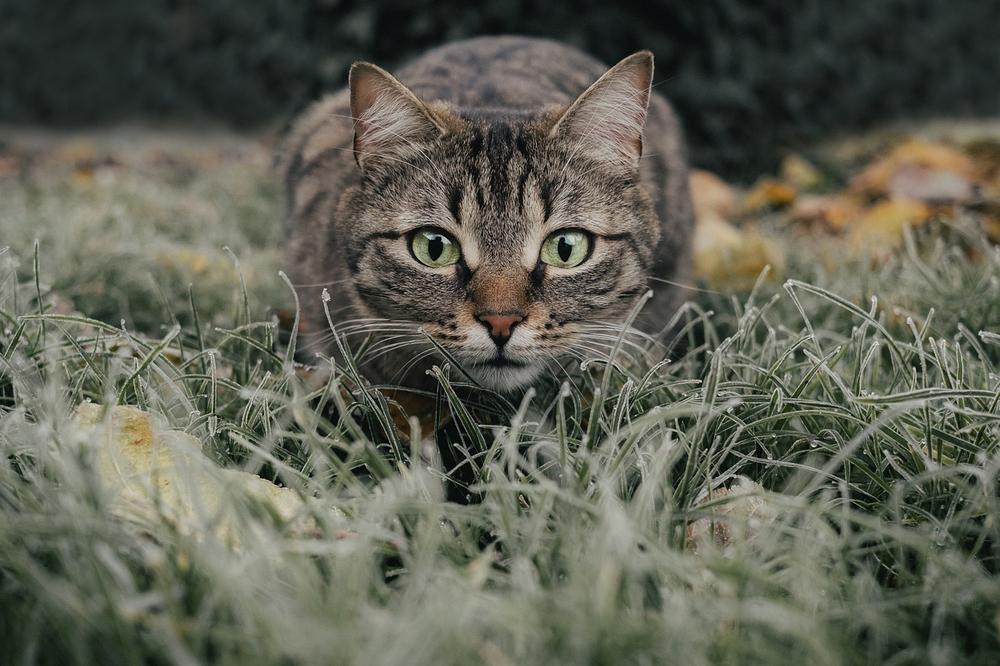Is Lemongrass Safe for Cats? Everything You Should Know

Concerned about the safety of your precious feline friend?
Worried about whether lemongrass could be a hidden danger?
I get it, believe me.
You've heard the rumors, the whispers in the cat-loving community.
But before you dive into an internet rabbit hole of conflicting opinions, let's set the record straight.
Together, we'll uncover the truth about lemongrass and its impact on our purrfect companions.
Buckle up, my friends, because we're about to embark on a journey to reveal the secrets behind lemongrass and its feline compatibility. 🐱
Let's get started!
Is Lemongrass Safe for Cats?
While lemongrass is generally safe for cats in moderation, you ought to monitor their consumption. Cats are unlikely to eat enough to cause serious illness, but it's still wise to keep it under control. Remember, each animal is unique and mysterious in its own way.
Lemongrass is safe for cats when consumed in moderation.
Yup, you heard it right.
Cats are sneaky creatures, so let's address the elephant in the room: they're probably not gonna munch on lemongrass for breakfast, lunch, and dinner like some avid foodies out there.
But hey, better safe than sorry, right?
While it's unlikely that your feline friend will gobble up enough lemongrass to cause any serious illness, you still gotta keep an eye on their consumption habits. Like everything else in life, moderation is key.

Now, here comes a little plot twist...
Unlike humans who can enjoy lemongrass without a worry in the world, lemongrass has the potential to harm cats, as well as dogs and other wildlife.
Guess they didn't get the memo about lemongrass being non-toxic.
You know what they say, each animal is unique and mysterious in its own way. Just when we thought we had it all figured out!
So, remember folks, if you've got cats at home, you ought to ensure lemongrass consumption is kept under control.
Better safe than sorry, right?
Meow!
Main points I'll expand upon further down this article:
- Lemongrass oil is harmful to cats due to their lack of specific liver enzymes.
- Concentrated forms of lemongrass, such as essence or essential oil, can be deadly.
- Diffusing or using lemongrass essential oil around cats can cause respiratory problems.
- Immediate veterinary help should be sought if exposure to lemongrass occurs.
- Lemongrass oil should always be diluted and never applied directly onto cats' bodies.
- Prevent large ingestions of lemongrass by keeping it out of reach and providing cat-friendly grasses as an alternative.
- Ingesting excessive amounts of lemongrass may lead to gastrointestinal upset and potential intestinal blockage.
- Treatment costs for lemongrass-related complications can range from $200 to $850 on average.
- Signs of lemongrass toxicity in cats include drooling, vomiting, tremors, and liver failure.
- Seek immediate veterinary care for cats showing signs of toxicity or strong cravings for lemongrass.
Preventing Lemongrass Poisoning in Cats
Here's what you need to know about cats and lemongrass to keep your furry friend safe.
- First things first, make sure to keep those lemongrass plants out of your cat's reach. You don't want them getting tempted to play with or chew on the plants, which could lead to some nasty consequences if they ingest any harmful stuff.
- Another thing to avoid is lemongrass oil. It can be super toxic for your cat, so it's best to just stay away from using anything with lemongrass oil around them.
- But let's say you absolutely need to use lemongrass oil for something important. If that's the case, make sure to properly dilute it at a 40: 1 ratio with a carrier oil. Don't go rubbing that stuff directly on your cat's body, though. That can be pretty harmful.
- To prevent your cat from going crazy over lemongrass, offer them some cat-friendly grasses instead. Give them some alternatives that won't make them overdose on lemongrass.
- Keep an eye out for any weird symptoms in your cat, like upset stomach or trouble breathing. If you notice anything concerning, don't waste any time. Get them to the vet right away. 🐱
Just follow these tips and take the necessary precautions, and you'll ensure your furry feline buddy stays safe and sound.
Let me break it down for you: Preventing lemongrass poisoning is crucial, but there's more you need to know. Further down the blog post, I'll share alternatives to create a cat-friendly environment without relying on lemongrass alone. Keep reading!
But what if your cat does consume lemongrass or show symptoms of toxicity?
Here's what you need to do next...
Signs of Lemongrass Toxicity in Cats
If you notice any signs of lemongrass toxicity in your cats, you need to take immediate action.

Lemongrass oil or essential oils can be fatal to cats and may lead to serious complications.
Here are some signs of lemongrass toxicity:
- Consuming lemongrass oil or essential oils: This can be fatal for cats and may cause liver damage.
- Symptoms of toxicity: These include drooling, vomiting, tremors, respiratory distress, low heart rate, liver failure, diarrhea, and upset stomach.
- Urgent veterinary care: If your cat shows these symptoms, seeking immediate veterinary care is necessary.
- Craving lemongrass: Cats with an intense craving for lemongrass may indicate an underlying nutritional deficiency, disease, or illness such as hyperthyroidism or anemia. Visit a vet for an examination to check for potential underlying conditions if this occurs.
- Veterinary diagnosis: Vets diagnose lemongrass poisoning by analyzing symptoms and conducting tests like biochemistry profiles, blood counts, and urinalysis.
- Treatment options: Treatment for lemongrass poisoning may involve IV fluid drip, anti-nausea medicine, antacids, surgical removal of obstruction, and careful monitoring of liver function.
If your cat has been exposed to large amounts of lemongrass or shows signs of poisoning, seek immediate veterinary care, potentially including stomach decontamination, intravenous fluids, and anti-nausea medication. ✨
But what can you do if you want to provide an alternative to lemongrass for your curious cats?
Alternatives to Lemongrass for Cat-Friendly Environments
If you love cats like I do, you want to keep them safe and happy. So, if you're looking for cat-friendly grasses that are not lemongrass, check out these three options:
- Oat grass: Cats can chew on this grass without any worries, plus it offers some nutritional benefits.
- Wheatgrass: This is another great choice that helps with digestion and provides essential nutrients for your furry friend.
- Alfalfa: Not only is alfalfa a safe alternative to lemongrass, but it also has anti-inflammatory properties and contains vitamins A, D, E, and K.
You guarantee that your cat can safely enjoy some nutritious greens by selecting these alternatives.
Cats are sensitive to scents, so even a little lemongrass can be overwhelming for them.
Offering these cat-safe grasses creates a delightful environment for them to explore.
Why risk your cat's well-being when you can stick to safe options like oat grass, wheatgrass, and alfalfa?
It's always better to be safe than sorry! 😺
To make sure you're keeping your cat safe and well-nourished with alternative grasses like oat grass, wheatgrass, and alfalfa, there's one more blog post you should check out.
Curious about whether it's safe for cats to indulge in Oreos? I've got you covered with my guide on Can Cats Eat Oreos.
In this article, you'll find out all the potential risks associated with this popular human treat.
What Are the Benefits of Lemongrass for Cats?
Lemongrass is packed with essential nutrients
Hey there cat lovers!
Did you know that lemongrass is not only delicious and refreshing, but it's also a nutritional powerhouse?
It contains important minerals like potassium, calcium, and magnesium, as well as vitamins that are beneficial to your furry friends.
It's like catnip, but with added health benefits
Get ready for another treat!
Just like catnip, lemongrass can work wonders for our feline pals.
Not only does it have antibacterial and antifungal properties, but it also aids in digestion and acts as a soothing agent for stomach troubles.
So if your kitty is experiencing some tummy issues, lemongrass might be just what they need!
Lemongrass offers multiple health advantages
Did you know that lemongrass has amazing benefits beyond digestion?

It's a superstar when it comes to detoxifying the body.
Thanks to its antioxidant properties, it can reduce inflammation and relieve joint pain, which older cats often experience.
And here's something mind-blowing:
Studies have shown that lemongrass has anticancer effects without any harmful side effects. That's truly remarkable, right?
By the way, have you ever wondered why lemongrass smells so good?
Well, that delightful scent and flavor come from citronella.
So not only will your cat enjoy the taste of lemongrass, but you'll also love its pleasant aroma.
And that wraps up today's article.
You've reached the end of my blog post, so let me ask you something: Did you enjoy it? I dedicated a great deal of time and effort into crafting comprehensive and helpful blog posts. It's a genuinely fulfilling process for me. Therefore, it would mean a lot to me if you could click on any of the social sharing icons to share this blog post with others. Thank you so much!
Talk soon,
-Sarah Davis